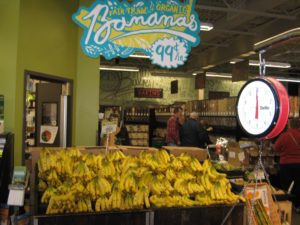

The Environmental Working Group (EWG) has long been a strong advocate, rooted in its own health research, for consumer awareness of fruits and vegetables with “high pesticide loads” that should be avoided “if at all possible.” Over the past couple of decades, it has developed an annual list of The Dirty Dozen with the recommendation that items on this list (conventionally grown) should be purchased “organic.”
Sonya Lunder, an EWG senior analyst with a Masters of Public Health in environmental health sciences from UC-Berkeley (who has conducted research focused on toxic chemicals in food) created a must-see short video (less than two minutes), which remains ever relevant. Succinctly stated: conventionally grown fruits and vegetables (70% back in 2012 when the video was created) often have pesticide residues that should be avoided especially by pregnant women and young children.
For 2017, EWG has issued, in addition to its list of “The Dirty 12,” a list for “The Clean 15.” (It is currently offering to send supporters who donate $15.00, a Shopper’s Guide to Pesticides in Produce bag tag to attach to a reusable shopping bag as a handy reminder of the fruits and vegetables to avoid when buying produce.)
EWG analyzed pesticide residue testing data from the U.S. Department of Agriculture (USDA) and the Food and Drug Administration (FDA) to come up with rankings for 48 popular produce items. Domestic and imported versions of three items (blueberries, green beans and snap peas) showed sharply different results so that domestic and imported versions are ranked separately on EWG’s full list, resulting in 51 entries for the 48 popular produce items. The top 12 items on the list of 51 are designated The Dirty Dozen, while the bottom 15 items on the full list are designated The Clean 15.
The Dirty Dozen, ranked by levels of pesticide residue, with 1 being the highest, for 2017 are as follows:(1) Strawberries, (2) Spinach, (3) Nectarines, (4) Apples, (5) Peaches, (6) Pears, (7) Cherries, (8) Grapes, (9) Celery, (10) Tomatoes, (11) Sweet bell peppers, and (12) Potatoes.
The Clean 15, with the lowest levels of pesticide residue, with 1 being the least, for 2017 are (1) Sweet corn, (2) Avocados, (3) Pineapples, (4) Cabbage, (5) Onions, (6) Frozen sweet peas, (7) Papayas, (8) Asparagus, (9) Mangoes, (10) Eggplant, (11) Honeydew melon, (12) Kiwis, (13) Cantaloupe, (14) Cauliflower, and (15) Grapefruit. The EWG points out that a small amount of sweet corn, papaya and summer squash (which appears at number 28 on the full list of 51 items) sold in the United States is produced from genetically modified seeds. The organization recommends buying organic varieties of these three crops if you want to avoid genetically modified produce.
One item on the full list which caught my attention was ranked at number 31, bananas. Although bananas have never appeared among The Dirty Dozen in the years the EWG has ranked produce for pesticide residues, my food co-op (the Honest Weight) in Albany, NY has taken special pride in selling only organic bananas, even though the co-op does sell conventional spinach (number 2 on the list of The Dirty Dozen) and other conventional fruits and vegetables. That might not seem logical since before eating a banana, the peel is discarded (composted hopefully) while spinach, for example, has no skin to peal off.
But there’s another important reason to sell only organic bananas and not conventional ones. For an individual consumer’s health and wellness, a conventional banana might not be among the items of produce that should be especially avoided since it appears more than halfway down the EWG list and as noted above, the peel is discarded. Nonetheless, there are other important reasons to choose organic fruits and vegetables: protection of the environment and the health of farmworkers. Spraying pesticides has the potential to affect negatively the health of farmworkers and the environment. Furthermore, the Honest Weight sells organic Equal Exchange bananas which are grown by “small scale banana farmers” who operate as non-profit cooperatives, an excellent reason (rooted in fair trade economics) to know where your banana comes from!
And an important closing note: with environmental protection no longer the modus operandi of the federal Environmental Protection Agency (EPA), with its takeover by advocates for the fossil fuel industry and the focus on short term profits over the future of our planet, the “working” aspect of the Environmental Working Group has become even more important. Case in point, the new head of the EPA, Scott Pruitt, earlier this month denied the petition of environmental advocacy organizations to outlaw chlorpyrifos, a pesticide often used on apples, oranges and other crops, even though the agency’s own safety experts concluded that the chemical should be outlawed. Check out reporter Roni Caryn Rabin’s article, Groups Seek Court’s Aid in Banning A Pesticide (4/6/17), in the New York Times.
(Frank W. Barrie, 4/13/17)
[UPDATE (FWB 4/18/17) Since the publication of this post, EWG has begun a petition campaign asking retailers, particularly large supermarket chains, to stop selling produce that has been sprayed with chlorpyrifos. Marketed by Dow AgroSciences under the names Lorsban and Dursban, EWG notes that it has been widely used to control insects in homes, gardens and lawns, as well as on farmland, but in June 2000, the company agreed to stop selling it for household uses because of the health risks it posed to children. But its agreement with the EPA did not extend to conventional agriculture, where it is still widely used on nearly 50 food crops, including fruits, vegetables and nuts. While Pruitt and the Trump administration’s decision ignored overwhelming evidence that small amounts of chlorpyrifos can damage parts of the brain that control language, memory, behavior and emotion, EWG notes it’s not too late for retailers to step up and do the right thing – but they need to hear from every one of us. Click here to add your name to the petition: Tell retailers to stand up for the health of their customers and stop selling fruits and vegetables that have been sprayed with chlorpyrifos! ]





